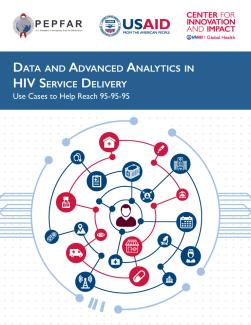As the gap to reaching targets of controlling and eliminating the HIV pandemic closes, the difficulty to achieve them increases. Achieving aggressive treatment targets will require continued innovation of personalized and differentiated care models, and the proliferation data-driven approaches.
USAID’s Data and Advanced Analytics in HIV Service Delivery: Use Cases to Help Reach 95-95-95 details high-priority advanced analytics use cases that could improve HIV service delivery globally. The vast volumes of structured and unstructured data collected on the millions of PLHIV globally can provide better insights through widespread use of advanced analytics techniques, such as clustering to better understand at-risk populations, predictive modeling to understand likelihood of risk for an individual, and optimization of ART inventory, to name a few examples. The report was led by technical advisors from USAID Southern Africa, Boston Consulting Group, as well as the USAID Center for Innovation and Impact (CII).
Data and Advanced Analytics in HIV Service Delivery:
- Maps pain points for HIV service delivery across the patient journey
- Identifies and prioritizes advanced analytics use cases to address pain points
- Landscapes potential data sources and identifies challenges and opportunities
- Delineates next steps for those interested in implementing similar solutions
Key learnings gained from this analysis can provide a useful launch pad for others seeking new approaches to improve HIV service delivery. The conceptual framework for this report could also be relevant to those working on conditions beyond the HIV space.
We hope you find this report helpful, will provide us your feedback, and let us know how CII can be helpful to you.

